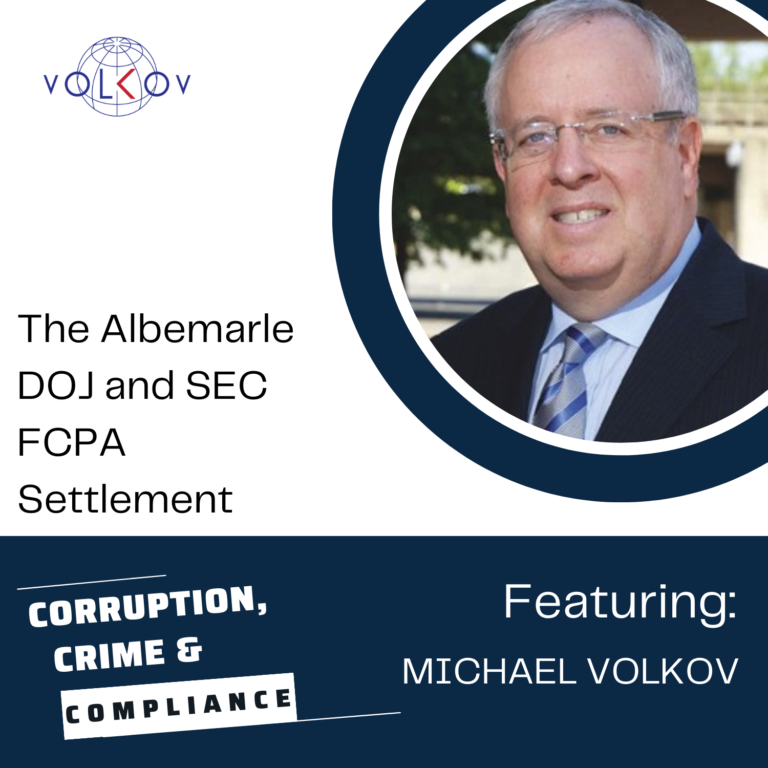Albemarle, a prominent specialty chemicals company, recently settled a case for $218 million, unraveling a web of bribery payments across Vietnam, Indonesia, and India. The repercussions of this case extend beyond the financial penalty, encompassing a three-year non-prosecution agreement and the application of the Compensation, Incentives, and Clawbacks pilot program. In this episode of Corruption, Crime and Compliance, Michael Volkov shares details of Albemarle’s FCPA settlement with the DOJ and SEC, exploring Albemarle’s voluntary disclosure, extensive remediation efforts, and a transformative shift in its business model.
You’ll hear Michael talk about:
- Albemarle agreed to pay over $218 million to settle investigations conducted by the DOJ and the SEC. This substantial financial penalty is a consequence of alleged bribery payments made by the company in multiple countries.
- The investigations focused on bribery payments related to various business transactions and dealings made by Albemarle in Vietnam, Indonesia, and India.
- As part of the settlement, Albemarle entered into a three-year non-prosecution agreement. While the company acknowledges certain wrongdoing, it avoids facing formal prosecution during the specified period if it complies with the agreed-upon terms and conditions.
- The settlement includes the application of the Compensation, Incentives, and Clawbacks pilot program. This program outlines mechanisms to ensure that executives and employees involved in wrongdoing face appropriate consequences, including clawing back certain incentives and compensation.
- Albemarle voluntarily disclosed information related to the potential FCPA violations. This proactive step is often a mitigating factor in settlements and reflects a willingness to cooperate with authorities.
- Albemarle undertook extensive remediation efforts in response to the allegations. This included disciplining employees involved in the wrongdoing, strengthening its anti-corruption program, and making significant changes to its business model and risk management processes.
- The investigations highlighted Albemarle’s use of sales agents in Vietnam, Indonesia, and India. Control deficiencies with third parties in China and the United Arab Emirates (UAE) were also noted, raising concerns about the oversight and due diligence processes related to these external entities.
- Michael shares details about specific bribery schemes involving state-owned entities such as Petro Vietnam in Vietnam, Pertamina in Indonesia, and IOCL in India. These schemes included practices like modifying tender requirements, providing nonpublic information, and directing agents not to include details in invoices concerning tips to foreign officials.
- The case underscores the risks of relying on third-party agents to secure contracts, particularly through the example of Albemarle’s failure to conduct due diligence on an agent in the UAE. The agent’s close ties to the UAE government and royal family contradicted representations made during the due diligence process.
KEY QUOTES
“And in this case, they rewarded Albemarle with an NPA as opposed to a deferred prosecution agreement. So it’s a three-year non-prosecution agreement, and doesn’t get filed with the court. There’s no information that’s filed. And they agreed to pay a penalty of approximately $98.2 million and an administrative forfeiture of $98.5 million. Also, this is the first FCPA settlement where we applied the Compensation, Incentives, and Clawbacks pilot program, which the DOJ had announced in March of 2023.” – Michael Volkov
“With respect to remediation efforts, the DOJ cited Albemarle’s extensive remedial measures, including that they started the remediation prior to the beginning of the DOJ’s investigation. In other words, they started to remediate quickly upon starting their own internal investigation.” – Michael Volkov
“Even after the third party intermediary had informed Albemarle that it was necessary to pay bribes to Pertamina officials to obtain business, the Indonesia sales agent paid bribes to foreign officials to obtain the contracts and also get nonpublic information concerning tenders and competitors products.” – Michael Volkov
Resources






